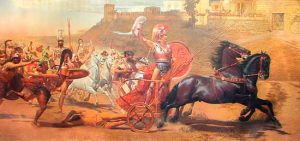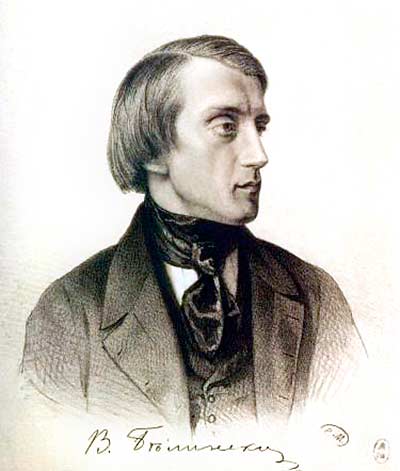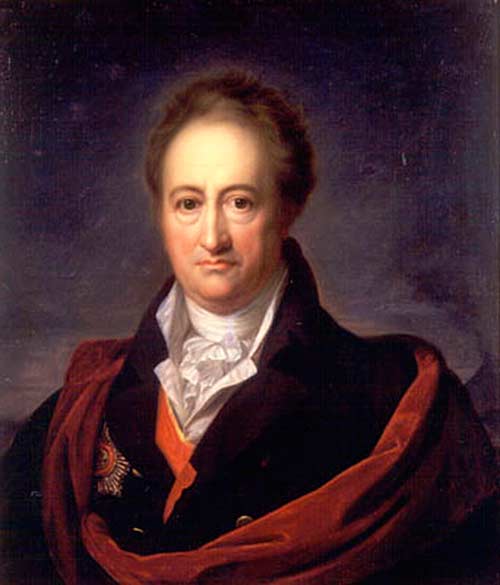Homer Iliad
 Homer’s poem “The Iliad” (see its full text and analysis) begins with a description of the wrath of the protagonist of the Greek army – Achilles. Nine years already spent the Greeks under Troy among the battles and raids. This is the fateful tenth year, the year of deciding the fate of the besieged city (see Trojan War), when suddenly the quarrel between Agamemnon and Achilles over the possession of the beautiful captive Briseis gives a new turn to affairs. Insulted in the sense of honor and love, the wrathful Achilles stays with their ships at the seashore and no longer goes into battles with the Trojans. With tears, he complains to his mother, the goddess Thetis, at the suffered resentment, and she prays to the celestial king Zeus to send victory to the Trojans until the Achaeans honor her son. Zeus nods his head in agreement, nodding so that his fragrant curls and height of Olympus are scattered and shaking and shaking.
Homer’s poem “The Iliad” (see its full text and analysis) begins with a description of the wrath of the protagonist of the Greek army – Achilles. Nine years already spent the Greeks under Troy among the battles and raids. This is the fateful tenth year, the year of deciding the fate of the besieged city (see Trojan War), when suddenly the quarrel between Agamemnon and Achilles over the possession of the beautiful captive Briseis gives a new turn to affairs. Insulted in the sense of honor and love, the wrathful Achilles stays with their ships at the seashore and no longer goes into battles with the Trojans. With tears, he complains to his mother, the goddess Thetis, at the suffered resentment, and she prays to the celestial king Zeus to send victory to the Trojans until the Achaeans honor her son. Zeus nods his head in agreement, nodding so that his fragrant curls and height of Olympus are scattered and shaking and shaking.
The Trojans, led by the brilliant Hector, soon take over the Greek enemies; They not only confront those in the open field near the walls of their city, they push them even into the ship camp, fortified with a moat and a rampart. Threatening death, stands Hector at the very pit and longs to overcome the last stronghold of the enemy.
In vain now the leader of the Greeks Agamemnon extends the hand of reconciliation to the wrathful Achilles; he is ready to give him Briseis, with seven other girls and various jewels to boot. Achilles remains unmoved: “Offer him to me at least all the treasures that are put together in the rich Orchomen or in Thebes of Egypt, and then I will not change my intentions until he completely eradicates my shame,” he replies to Agamemnon’s envoys.
The pressure of the enemies is becoming more threatening. No matter how bravely the Achaeans defend the fortifications, Hector finally crushes the gates with a huge stone block. As felled ash, Achaeans fall under the blows of the Trojans. The hero of Protesilaus is already on fire and threatens to ignite the rest of the Hellenic fleet. Confusion and noise fill the entire Hellenic camp.
See also the articles Heroes of the Trojan War – the Greeks, The Iliad Plot, Homer’s epic
Then to Achilles his best friend Patroclus is in a hurry. “You,” says Patroclus, “did not give birth to Peleus and Thetis, the gloomy abyss and the surface rocks produced you: your heart is as insensitive as a stone.” With tears, he asks Achilles for permission to take his armor and go with her to fight at the head of his tribe, the Myrmidonians, so that the Trojans, having taken him for Pelid himself, would dare to push the ships more. Achilles agrees, but so that Patroclus only chases the enemy behind the fortress moat, and then immediately returns.
In the heat of battle, Patroclus pursues traveling Trojans to the very city walls and makes terrible havoc. But disarmed and frightened by the patron saint of Troy, the god Apollo, pierced by the spear of Hector, he falls into dust. With difficulty they save his dead body and bring it to the Greek camp; Patroclus’s weapons and armor become the prey of the winner.
Infinite sorrow of Achilles about a fallen comrade, a meek, sweetheart hero. Achilles wishes to rest next to a friend in a burial mound. With fear, Thetis is heard in the depths of the sea’s mournful cry of a dear son, and hurries with his sisters to the Trojan shore. “Has Zeus committed for you all that you have not prayed for?” She says to her crying son. And he replies that life is not sweet to him as long as Hector does not fall before him in the dust, pierced by his heavy spear.
Achilles is burning with thought of revenge. While Thetis hurries to Hephaestus to get a new weapon for him from her son, the battle is again approaching the ships. But Achilles shouts three times through the moat in his loud voice, and the frightened Trojans immediately fled. Contrary to the advice of Polidam, Trojans, at the call of Hector, spend the night at the guard lights in the open field.
At dawn, Achilles, in new arms and with a shield of multifree work, rushes to their camp, swinging a heavy spear of strong ash. The destroyer rages terribly among the Trojan regiments: he fills the Scamander river with corpses, so that the waves are saturated with blood and reddened. Seeing such a misfortune, the Trojan King Priam orders the guard to open the gates to those who are running, but not to let the wings out of their hands so that Achilles does not rush into the city. One Hector remains behind the gate, disregarding the requests of the supplicant parents, who look at him from above the tower. However, when Achilles appears with a terrible ash spear on his mighty shoulder, Hector’s heart shudders, and in fear he runs around the wall of Troy three times.
Zeus becomes sorry for the knight pursued by Achilles: Hector has always honored him with offerings and prayers. Zeus weighs the lot of both on the golden scales of fate, but Hector’s cup goes down. Achilles overtakes him, pierces him with a spear, ties them to the chariot with his feet, so that the beautiful head of Hector dabbles in dust, and drives the horses to the ships among the plaintive howls from the walls of Troy….



